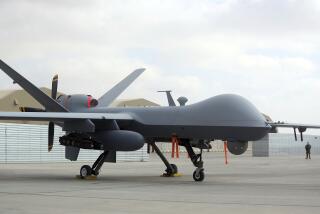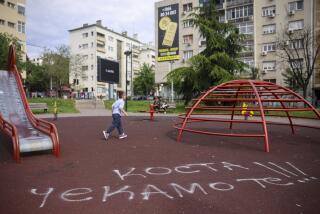Yugoslav General Issues Warning to West
- Share via
BELGRADE, Yugoslavia — Gen. Zivota Panic, the Yugoslav army’s chief of staff, warned the international community on Wednesday that federal forces may retaliate if there is a foreign military intervention in Bosnia-Herzegovina.
The possibility of some sort of foreign military action in Bosnia has seemed to grow in recent days as the Western allies and the United Nations have focused their attention on ways to halt Serbia’s aggression--through economic sanctions and other sterner measures, such as the enforcement of a U.N.-imposed “no-fly zone.”
But Panic said in an interview to be published today: “I personally believe the Yugoslav army cannot stand aside if the biological survival of the Serbian people in Bosnia is brought into question. Although any foreign military intervention on the territory of the former Yugoslavia would be completely illogical and would risk spreading the flames of war throughout the European continent and beyond, the Yugoslav army has been on alert for a long time. It is prepared to respond with force to eventual aggression.”
His comments may signal a radical change of policy in the top echelons of the Yugoslav federal army. The army, so far, has maintained that it is only responsible for defending the borders of the Yugoslav Federation, which now includes only Serbia and its tiny ally Montenegro.
On May 31, the United Nations imposed sanctions on the rump Yugoslavia for its support of Serbia’s aggressive conduct in Bosnia, a former Yugoslav republic.
Yugoslav and Serbian leaders, since the withdrawal of the federal army from Bosnia in May, have argued that Belgrade has no connection with Bosnian Serb forces, which control 70% of Bosnia’s territory.
Panic made it clear that, despite the Yugoslav army’s formal withdrawal from the area, the federal military plans to intervene in Bosnia to defend Serbs outside of the rump Yugoslavia if there is a foreign military attack.
“If Panic’s statement means that Serbia and Montenegro intend to become directly involved in a confrontation with the Security Council, this will have profound effects for the Serbian people,” a Western diplomat said.
On Wednesday, Bosnian Serb leader Radovan Karadzic also repeated his contention that U.N. forces on the ground in Bosnia will not be safe if there is any sort of Western military intervention. He said those troops in Bosnia now from NATO countries that have called for a military intervention should be replaced by forces from “friendly countries.”
While he underscored his support for “peace initiatives,” he warned that he would not be able to guarantee the safety of U.N. peacekeepers if there is foreign military action in Bosnia. Serbian leaders have defined the enforcement of the no-fly zone as such an intervention.
Karadzic’s comments appeared aimed at heading off Western plans for military intervention to end the fighting. He said he had written to President-elect Bill Clinton, saying enforcement of the no-fly zone was unnecessary because there had been no combat flights.
Nonetheless, the 16 NATO allies formally handed over to the Security Council contingency plans for a military intervention. Unconfirmed reports say the possible measures include damaging airfields and shooting down Serbian aircraft.
After the apparent weekend election victory of Serbian President Slobodan Milosevic over Yugoslav Prime Minister Milan Panic, who had pledged to stop the war in Bosnia, an atmosphere of anxiety has gripped Belgrade. Ultranationalist extremists and their Socialist allies gained a controlling majority in the Serbian Parliament, according to unofficial results.
More to Read
Sign up for Essential California
The most important California stories and recommendations in your inbox every morning.
You may occasionally receive promotional content from the Los Angeles Times.













